If you’re in the Peterborough area, you should check out their website:
http://bales4bunnies.webs.com/bales4bunnies-products
My bunnies love their hay and you can’t beat the price!
– The Bb Buns
Being prey animals, rabbits and other ‘small pets’ such as guinea pigs, rats, mice and hamsters are experts at hiding illness, often until it is too late. This is a natural instinct as in the wild showing weakness would attract the unwanted attention of predators. Although we have now domesticated these animals and they live spoiled and happy in the safety of our homes, they still maintain the trait of hiding their symptoms. For the uneducated or busy pet owner these can easily go unnoticed and for our very delicate rabbit illness can quickly turn fatal before we are even aware something is wrong.
One of the first signs of illness in small animals is weight loss. This could indicate anything from a blockage, teeth issues, URI’s, UTI’s and arthritis as well as a number of other potentially serious ailments. When your pet isn’t feeling it’s best they will most likely experience a loss of appetite. If they aren’t eating as much they will undoubtedly begin to lose weight. As many of these animals are highly social and should live in pairs or groups, it can also be difficult to tell just how much your pet is eating by watching them – especially if you are still seeing them head over to the food dish at meal time. Weighing your pet regularly ensures they are feeling well enough to have a healthy appetite.
How Often Should I Weigh My Rabbit?
Weighing your rabbit or other small pet on a weekly basis will give you a good idea of their average weight and notify you quickly of any potential health concerns. Also keep in mind that different activities and meals throughout the day will cause a fluctuation in your pet’s weight. For this reason it is important to weigh your pet around the same time every week so that your reading is as accurate as possible.
What Do I Use To Weigh My Rabbit?
I use a digital shipping scale purchased from Staples to weigh my rabbits. With small animals every gram counts which is why a digital scale is recommended as it will provide you with the most accurate reading. Most digital scales made for humans are unable to accurately calculate the weight of anything under 2.27kgs (5lbs) so unless you have quite a large rabbit, a scale built to measure light weight items is more suitable. Large kitchen scales (as long as it’s digital) will also work.
You will also want a notebook or to create a chart on the computer to log the date and weight of your pet.
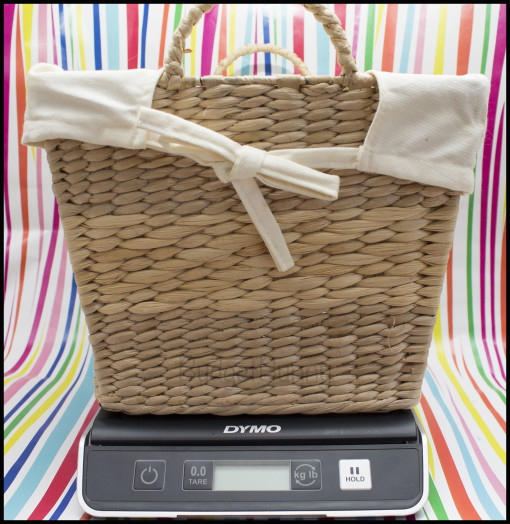 How Do I Weigh My Rabbit?
How Do I Weigh My Rabbit?
You will have a difficult time getting your pet to hold still when placed on the scale so it is best to put them in something to keep them in place. I’ve found that a small box or basket works great! You will of course need to calculate the weight of the box first so that it isn’t factored in to your pet’s final weight.
Step 1: Put the empty box on the scale.
Step 2: Once it has calculated the weight of the box, hit ‘Tare’. This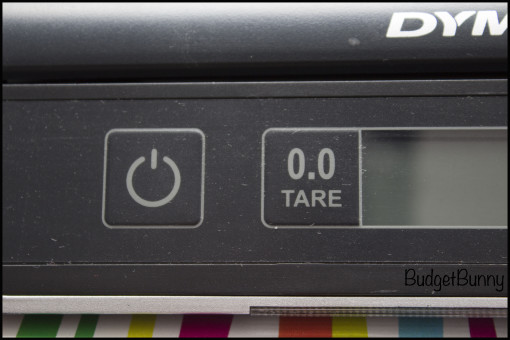 will set the scale back at 0 so it is no longer factoring in the weight of the box when you weigh your pet.
will set the scale back at 0 so it is no longer factoring in the weight of the box when you weigh your pet.
Step 3: Place your pet in the box on top of the scale. Wait until your pet is still and the number on the scale stops fluctuating.
Step 4: Record the number, take your pet home and make sure to reward them for their good behaviour with a healthy treat!
How Do I Figure Out My Rabbit’s Average Weight?
Once you have weighed your pet for 5 weeks straight, add up these numbers and divide them by 5. This will give you the average weight for all 5 weeks. Now you have a weight to compare future weigh-ins to.
Example: 2320g + 2332g + 2325g + 2322g +2329g = 11628g \ 5 = 2325.6g
The average weight is 2325.6g
If you are keeping your daily routine and weigh-in time the same and your pet is healthy, then you should see very little fluctuation in your pet’s weight from week to week. Our one guinea pig has stayed the same weight down to the gram for the last two years.
If your pet loses more than 10% of it’s average weight in a week then this is cause for concern.
Similarly a sudden or drastic gain in weight is also cause for concern. Infection can cause your pet to retain fluid and the presence of bladder stones or tumours could add weight in early stages.
Before you begin to panic, examine your pet’s environment and behaviour closely. Have you recently introduced a new member to your family that could be hoarding more food? Are you providing unlimited hay and lots of fresh water? Is your pet getting the exercise and attention that it normally does? Have you changed anything in their living area, weighed at a different time, changed diet around etc. that could provide a cause for the sudden weight loss or gain?
If you are noticing behavioural changes such as your pet hiding more, not coming out to see you, not interested in food, heavy breathing, discharge from the nose, urine dribbles around the cage etc. then it is time to book a vet appointment!
If however the weight loss wasn’t too substantial and you are seeing no other reason to be alarmed, then you can continue to monitor your pet closely and begin weighing daily. Just like with your weekly weigh-ins, be consistent with your routine and the time of day that you are weighing to get the most accurate results. If you continue to notice your pet losing weight consistently over the next couple of days or any other changes in their behaviour, then you need to get your pet to your exotic vet as soon as possible.
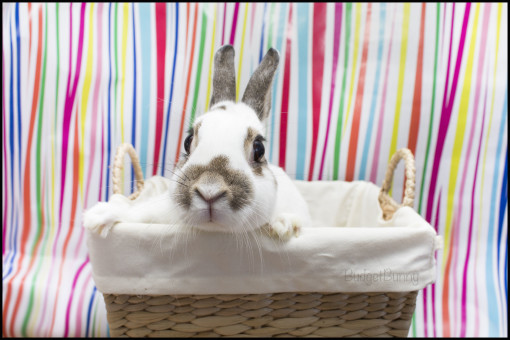 When Should I Book A Vet Appointment?
When Should I Book A Vet Appointment?
Even if you haven’t noticed any other behavioural changes in your pet, it is always a good idea to book an exam with your rabbit savvy vet at the first sign of weight loss. Vets can book up quickly and you can always cancel the appointment if needed.
If your pet recovers the weight but you notice regular weight fluctuations, book a vet appointment. There could be something going on internally that is not visible to you. It is also a good idea to review previous weigh-ins when you record your pet’s weight as a slow and steady weight loss or gain is also a cause for concern.
If you are noticing any behavioural changes or your pet’s weight continues to drop, book a vet visit as soon as possible!
If you haven’t been to the vet in over a year, this is a good time to book a vet appointment. Your exotic vet is a trained professional who will be able to assess things that you’re not able to at home. This also keeps your rabbit’s chart updated, making it easier for them to diagnose any future health problems or concerns.
Remember, it is best to find an experienced exotic vet before an emergency situation arises. Knowing you have a qualified vet to turn to assures your rabbit will get the best care as quickly as possible. For more tips on finding a rabbit savvy vet click here.
Keeping a weekly log of your small pet’s weight is an essential tool to monitoring your pet’s overall health and well being. By doing so, you are more likely to catch illness in your pet early so that it can be treated effectively. Remember that not all illnesses, especially those that come on suddenly, will be accompanied by weight loss. Knowing your pet and being familiar with their normal behaviour and routine in conjunction with weekly weigh-ins are both important tools in monitoring their health.
You’ve just adopted a rabbit from your local rescue/shelter and you’re excited to bring bunny home! Here are some tips for a smooth transition to home living.
Set Up Bunny’s Living Quarters Ahead Of Time, If Possible.
Bunny will need spacious housing – at least 6 times its out-stretched length and twice as tall in height, to hop abou t and live in. The more space the better! I recommend a condo or x-pen for rabbits which affords several advantages over other types of housing sold in pet stores. X-pens are spacious, sturdy, available in several heights and are cheaper. They are also portable, can be covered with binder-clipped sheets on top, and the 8 panels can be configured into whatever shape required.
t and live in. The more space the better! I recommend a condo or x-pen for rabbits which affords several advantages over other types of housing sold in pet stores. X-pens are spacious, sturdy, available in several heights and are cheaper. They are also portable, can be covered with binder-clipped sheets on top, and the 8 panels can be configured into whatever shape required.
Homemade custom-built condos made from wire shelving units also work well as housing.
You can learn how to build your very own rabbit condo here.
What I don’t recommend are most store bought rabbit cages which are far too small. Inside the x-pen or condo, place a litterbox with wood-stove pellets or other rabbit-safe litter as well as a large pile of hay to eat, a sturdy cardboard ‘hidey’ box with two openings and two heavy ceramic crocks: a smaller one for food and a larger one for fresh water. Provide sturdy, flooring such as vinyl/laminate flooring, foam or seagrass mats, fleece blankets/quilts/towels/rugs for traction. Toss in some toys for recreation and rotate chew toys frequently.
For more great and creative housing ideas make sure to check out our Facebook Album: House Rabbit Housing!
Don’t Fuss Over Bunny.
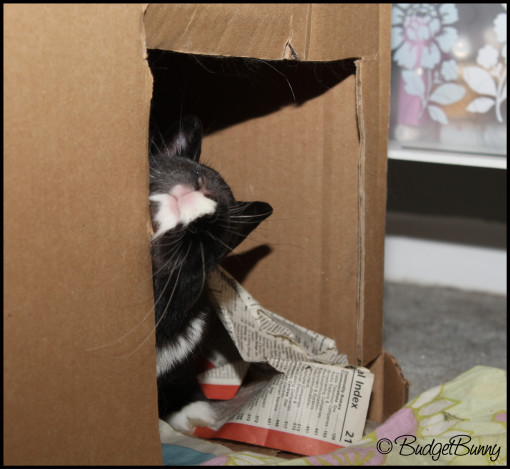 It’s tempting to hold and play with your new bunny straight away, but what it really needs is to be left alone for a while upon arrival. This will give it time to chin/scent and leave some territorial droppings in its new abode. This will make bunny feel more comfortable in your home, where nothing yet smells familiar. Try to leave bunny in its area without immediately forcing your attention on it. Sitting on the floor near the rabbit’s pen and quietly reading/ working is ideal. This allows your rabbit to observe you from a safe distance and encourages its natural sense of curiosity to investigate you and its new surroundings. Always allow your rabbit to exit/enter the pen on its own, rather than lifting/carrying the rabbit out of/into its enclosure.
It’s tempting to hold and play with your new bunny straight away, but what it really needs is to be left alone for a while upon arrival. This will give it time to chin/scent and leave some territorial droppings in its new abode. This will make bunny feel more comfortable in your home, where nothing yet smells familiar. Try to leave bunny in its area without immediately forcing your attention on it. Sitting on the floor near the rabbit’s pen and quietly reading/ working is ideal. This allows your rabbit to observe you from a safe distance and encourages its natural sense of curiosity to investigate you and its new surroundings. Always allow your rabbit to exit/enter the pen on its own, rather than lifting/carrying the rabbit out of/into its enclosure.
Be Patient.
Building trust with your rabbit may take some time. As prey animals, rabbits are wary of anything larger than them,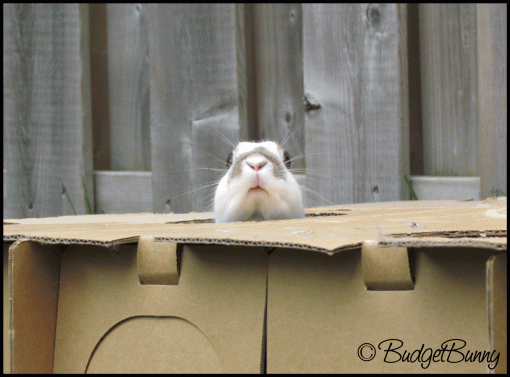 including people. Once bunny learns to associate you with positive things like food, toys, treats and playtime, bunny should gradually let down its guard. Every rabbit is unique, and has experienced different things during the course of its lifetime. Some may be quite confident, and some may be extremely fearful due to their nature and experience. However, even the most skittish rabbit can be made to feel more comfortable over time with patience and understanding on your part. Try placing a healthy treat just outside bunny’s enclosure to start, and then have it investigate a treat held in your hand or lap. Take it slowly at the bunny’s pace, and revel in the small successes when bunny approaches. You can learn more about taming your rabbit here.
including people. Once bunny learns to associate you with positive things like food, toys, treats and playtime, bunny should gradually let down its guard. Every rabbit is unique, and has experienced different things during the course of its lifetime. Some may be quite confident, and some may be extremely fearful due to their nature and experience. However, even the most skittish rabbit can be made to feel more comfortable over time with patience and understanding on your part. Try placing a healthy treat just outside bunny’s enclosure to start, and then have it investigate a treat held in your hand or lap. Take it slowly at the bunny’s pace, and revel in the small successes when bunny approaches. You can learn more about taming your rabbit here.
Always Allow Bunny To Emerge From & Re-Enter Into Its Pen On Its Own.
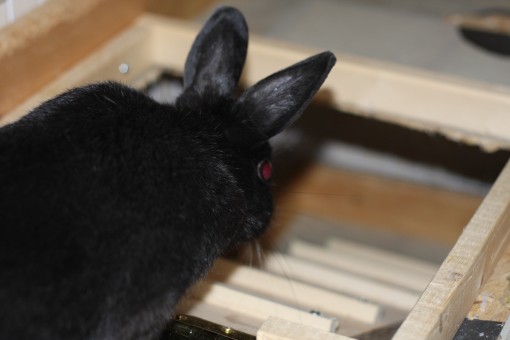 Rabbits don’t like being handled as a general rule. Daily exercise time is very important and you want to aim for at least three hours of free run time daily. Be sure to rabbit-proof your home by hiding/blocking access to electrical cords and phone/computer rechargers etc., as bunny’s roaming space is enlarged. Anything left on the floor or elsewhere that your rabbit can reach may be nibbled. This includes clothing, shoes, briefcases/purses, books and furniture. Loud noises and quick movements will generally frighten your rabbit, so avoid them. If you have other animals at home, don’t introduce bunny to them right away. After bunny is feeling a bit more comfortable at home you can try meet and greets for short periods of time, slowly over a number of days/weeks — and always under close supervision. Always provide your rabbit with a designated space of its own and always remember that its safety and well-being is most important.
Rabbits don’t like being handled as a general rule. Daily exercise time is very important and you want to aim for at least three hours of free run time daily. Be sure to rabbit-proof your home by hiding/blocking access to electrical cords and phone/computer rechargers etc., as bunny’s roaming space is enlarged. Anything left on the floor or elsewhere that your rabbit can reach may be nibbled. This includes clothing, shoes, briefcases/purses, books and furniture. Loud noises and quick movements will generally frighten your rabbit, so avoid them. If you have other animals at home, don’t introduce bunny to them right away. After bunny is feeling a bit more comfortable at home you can try meet and greets for short periods of time, slowly over a number of days/weeks — and always under close supervision. Always provide your rabbit with a designated space of its own and always remember that its safety and well-being is most important.
If Bunny Is Extremely Shy And Won’t Leave Its Pen, Try This:
‘Play dead’ on the floor near the rabbit by lying motionless until bunny approaches you. Expect bunny to nudge you
and perhaps even to hop up onto your back or stomach out of curiosity. When bunny is comfortable doing this, try to speak softly to your bunny and/or reward it with a healthy treat afterward. Positive reinforcement will help bunny associate you with good things!
Using these tips, even a very shy bunny should eventually feel more comfortable at home. Every rabbit is different, however, and some may take months to ‘settle in’ rather than a few days or weeks. Don’t give up on your rabbit! Be patient and bunny will reward your efforts. Feeling at an impasse in your relationship with bunny? Consult budgetbunny.ca and rabbit.org for ideas or ask to speak with a rabbit specialist from your local rabbit rescue organization/shelter. They’re happy to help!
Written By: The Bunderful Iris – Guest Blogger
Did you know that February is Adopt A Rescued Rabbit Month?
Unfortunately rabbits are the third most abandoned animal at shelters. Unlike what you may have heard, these animals are not ‘starter’ pets. Rabbits need the attention and commitment of a cat or dog, require several hours of daily free range exercise and do best with a companion of their own kind.
So Why Adopt A Rabbit?
1) Rabbits can be easily litter trained.
2) Rabbits are extremely social and love to interact with you.
3) Rabbits have a life span of approximately 8-10 years.
4) Rabbits are fairly quiet, do not require outside bathroom trips or frequent walks.
5) With some rabbit proofing, rabbits make great and clean house pets!
There Are Many Reasons To Adopt Your Next Pet:
By choosing to adopt you are giving a displaced pet the loving, forever home that it deserves! And not only are you saving the life of that animal but you are freeing up a space so the rescue can take in another.
Prior to being adopted out, most shelters and rescues will have surrendered animals examined by a vet, get them up to date on any necessary vaccines, spay and neuter the animal (when applicable) and treat any health issues. You can be assured that when that furbaby joins your home it is in the best of health. Any animals with chronic health conditions requiring ongoing treatment or medications will have these medical conditions listed in their description so there are no surprises.
The staff and volunteers at your local shelter are there to make sure that you end up with the right pet to suit your needs and lifestyle. They want these animals to be happy in their forever home as much as you do and that means helping you identify what you are looking for in an animal as well as how much space, time and money you have to dedicate to a pet. Most rescues have a screening process to ensure the right animal goes home with the right owner.
Adoption fees typically include a full health check by a qualified veterinarian, spay/neuter, necessary vaccines and any medical treatments required to get that pet back to full health. This fee is minimal when you consider what it would cost for you to have these done yourself at your local vet’s office.
An adoption takes time to process. There are applications to complete and a screening process to undergo before you get to bring home that pet. Unlike buying a pet on a whim this gives you time to really consider if you are serious about sharing your life with a furry friend.
There is nothing like the feeling of knowing that because of you an animal has been given a second chance. And trust me, they will thank you for it every day.
A rabbit is not for everyone. Please make sure to check out our videos including Is A Rabbit The Right Pet For You?
And if you’re not ready to make the commitment but are still passionate about these wonderful animals, please consider making a donation to your local rabbit rescue or shelter. Your contribution could help neuter or spay a rabbit in need, provide food and temporary housing or pay for any required medical treatment.
Question:
Hi Bb!
We were thinking about purchasing a large ball to put our bunny in so that he can run around safely without us having to bunny-proof our home. Are there any dangers with doing this?
Thanks,
M.
Answer:
Hi M,
Thank you for your question! Exercise balls should not be used for rabbits. There are none that are large enough for a rabbit, would not provide adequate ventilation and would force your rabbit to curve it’s spine at an awkward angle. Rabbits also don’t walk or run like small rodents do, they hop, which would make it extremely difficult for them to move around comfortably in a ball. I would suggest bunny proofing an area of your home so your rabbit can move around and stretch it’s legs naturally.
A few weeks ago, Mom and Dad braved a snowstorm to pick up 6 bales of farm fresh timothy hay from Bales4Bunnies! Hay is the most important part of our diet you know and should always be available in unlimited amounts!
When Mom and Dad got home they set to work dividing the hay in to storage containers and sacks. Now it’s taking over our house! There’s hay here…
…and here….
…and lots under here! There are even five more bins tucked under there full of the good stuff! I think we’ll be set for a while!
If you’re in the Peterborough area, you should check out their website:
http://bales4bunnies.webs.com/bales4bunnies-products
My bunnies love their hay and you can’t beat the price!
– The Bb Buns
Question:
Are rabbits rodents?
R.
Answer:
Hi R!
Rabbits are actually lagomorphs and not rodents. Interestingly enough rabbits were classified as rodents until the early 1900’s and the main difference between the two orders is the shape of their teeth!
The holidays are behind us and life is returning to normal. Many of us find ourselves re-evaluating our goals and priorities at this time of year and making resolutions to better ourselves! But what about our pets?
Here are some great resolutions to implement in to your rabbit’s life!
 Diet & Exercise
Diet & Exercise
The holiday season can be an incredibly chaotic time of year and it can be easy to forget some of the most basic essentials our rabbit’s need to maintain a healthy and happy life. Hay and water should always be available in unlimited amounts while pellets should only make up about 5% of your rabbit’s daily diet. The general rule of thumb is approximately 1/4 cup of pellets per every 5lbs of rabbit. You can find more information on a rabbit’s diet here.
Your rabbit should also be getting a minimum of 3 hours of daily free range floor time to stretch their legs, explore and have some fun! Regular
exercise will keep them happy, prevent physical problems like poor muscle tone and weight gain as well as prevent behavioural problems.
Play With Your Pet
Winter is the perfect time to teach a new trick, try clicker training and make some fun and exciting toys for your rabbit. You can get some great ideas from our DIY Toy section here. Spending more quality time with your rabbit will help improve your bond and beat those January blahs!
When it’s busy this can be an easy one to forget, but a weekly health check is an essential preventative measure to catch health problems early! It’s also a great way to spend some quality time with your rabbit. During lap time give a gentle bunny massage and feel your rabbit’s body head to toe to make sure there aren’t any lumps and bumps you may have missed. This is also a great time to examine eyes, ears, nose and genital area to ensure everything looks fresh and clean. Don’t forget to check those nails and clip as needed.
Weekly weigh-ins are also a key indicator of early health issues. Being prey animals, rabbits can hide their illnesses well and sometimes we don’t catch on until it’s too late. Weight loss is often one of the first signs of illness so weighing your rabbit weekly will give you a base weight to then judge each additional weight off of in the future.
Schedule A Vet Trip
Annual checks aren’t mandatory in North America so this one often gets overlooked. Even if your rabbit appears to be in good health it is always a good idea to schedule an annual wellness check at your rabbit savvy vet. For more on finding the right vet for you click here. Your vet will check things that you may not be able to at home and may notice underlying health problems you have missed. This also keeps your rabbit’s chart updated, making it easier for them to diagnose any health problems or concerns that may pop up in the future. This is especially important if you have senior rabbits (5+ years old) because health problems and age tend to coincide. And if anything it will give you peace of mind that your pet is in perfect condition for it’s age.
The snow is whipping around outside, it’s freezing cold and most of us are hibernating in our homes until Spring arrives! It’s the perfect time for a great indoor project like building your rabbit a new home! Remember your rabbit should be housed in nothing smaller than a pen measuring 12 square feet. They need to be able to comfortably hop at least three times from one end to the other, sit up on their hind legs and periscope around. Additional levels to the enclosure will help keep those back legs nice and strong. If your rabbit’s cage does not meet these requirements then consider building them a new home this winter! To learn more about building your own rabbit condo click here.
Bunny Proofing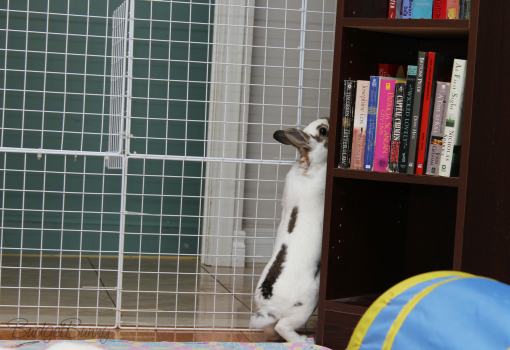
This is also a great time to get down on your hands and knees and double check your rabbit’s play area. Make sure any loose cords are tucked away or covered in cord protectors, unused outlets have baby locks on them and that household cleaners or any leftover holiday decorations are up and out of the way. You may be surprised to find that your rabbit went to town on the baseboards behind your couch and that you will need to block that off for future play time or that your bun has been digging a hole in your carpet. Before these cause damage to your rabbit, block them off. You can find more on bunny proofing here.
This 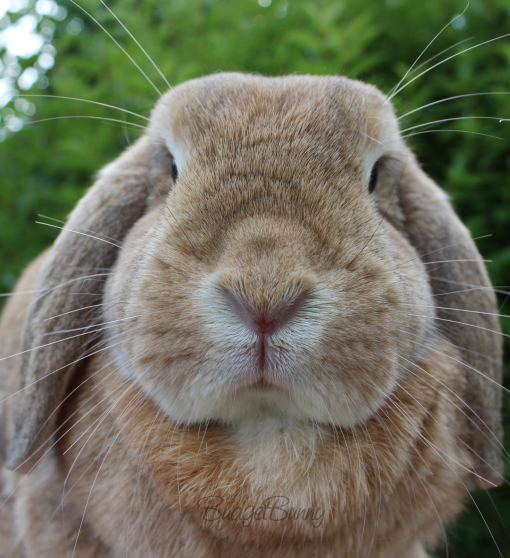 may also be a good time to inspect your rabbit’s cage for any wear and tear and fix or patch up areas of concern.
may also be a good time to inspect your rabbit’s cage for any wear and tear and fix or patch up areas of concern.
Adopt Your Next Rabbit
February is just around the corner which means it’s almost Adopt A Rescued Rabbit month! If you have been considering welcoming a bunny in to your home why not make the resolution to adopt?! Rabbits are the third most abandoned animals in shelters and one of the most neglected and misunderstood pets out there! I promise your rescued rabbit will thank you for it!
This is a personal resolution for me! We all want our rabbits to live a long and healthy life and I certainly hope that they do! But the fact is we don’t know how long we will have with our beloved furbabies. Cherish every moment you have with them and capture as many memories as you can. With digital technology it costs us nothing to snap away and some times those candid shots will end up being the ones you treasure most.
Hopefully this gave you some fun and beneficial ideas to better your rabbit’s life and strengthen your bond!
Wishing You All A Healthy And Hoppy 2015!
Question:
What is the minimum size my rabbit’s cage should be?
A.
Answer:
Hi A,
The minimum standard set by the House Rabbit Society is an ex-pen. An ex-pen formed in to a rectangular shape is 6′ long x 2′ wide equalling 12 square feet of floor space. Your rabbit’s cage needs to be tall enough for your rabbit to easily stand up on his or her legs to periscope around as well as comfortably hop at least three times and not hit anything. On top of this your rabbit also requires at least 3 hours of free range daily floor time but more is always better!
If you are looking to build a cost effective and suitable home for your rabbit I highly suggest checking out the following links:
Blog: Building Your Own Bunny Condo – A Step By Step How To
Video: How To Build A Rabbit Condo
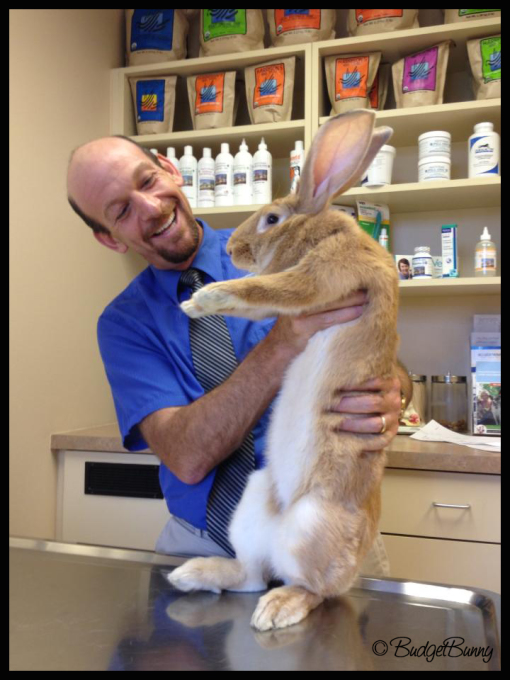 So your new fluffy companion is settling in to their new home and you’ve already called all of your friends and family to tell them the exciting news – you are the proud owner of a rabbit! But….what next?!
So your new fluffy companion is settling in to their new home and you’ve already called all of your friends and family to tell them the exciting news – you are the proud owner of a rabbit! But….what next?!
If you haven’t already started searching for a rabbit savvy vet this is a great time to start calling the clinics in your area to find the right one. Not all vets are qualified to treat exotic animals. Rabbit’s are fragile creatures with complex digestive systems and require specialized care. A vet who specializes in ‘small pets’ has gone through different levels of education in order to understand their particular needs and anatomy. Fortunately, we are seeing more vets qualified with these exotic animals as they become a more common household pet. Unfortunately there are vets out there who will see your small pet but not actually be educated in exotics. This can be life threatening to your rabbit, especially if they are prescribed any medications or to undergo surgery so it is very important to find a vet who is properly qualified.
It is best to find a vet you can trust early on. You never know when an emergency situation is going to pop up and can leave you feeling panicked. Knowing you have a qualified vet to turn to assures your rabbit will get the best care as quickly as possible.
So how do you find the right vet for your rabbit? Begin by calling all of the veterinary offices in your area, even those you think only see cats and dogs, and ask them if they have a vet that specializes in rabbits. You may be surprised to find out that one of these locations does have an exotic vet on staff! Even if you find a vet that does deal with exotics early on in your search, it is always a good idea to call a number of clinics to get an idea of the exotic vets in your area. This also gives you some options so you can feel out multiple vets and choose the right one for you and your rabbit. For those clinics who don’t deal with exotics ask them if they know of any local exotic vets that they would recommend. Hopefully a few of these will direct you to the same exotic clinic which should mean that particular one has a good reputation.
Now that you have a list of veterinary clinics that will see your rabbit, you will want to follow up with them and see how knowledgeable they are. When you call, ask to speak to the vet that sees rabbits or leave a message for him/her to contact you in between appointments as the receptionist answering the phone may not be educated about rabbits.
Here is a list of some great questions to ask the rabbit savvy vet on staff:
How many rabbits do you see in a week?
How many rabbits have you successfully neutered or spayed? How many have not survived the procedure?
How long have you been practicing as an exotic vet? Have you won any awards or recognitions for your work?
What is the pre-op process for a rabbit? The answer you should be given is that your rabbit is to continue eating and drinking until they enter surgery. Unlike a cat or dog which is required to fast prior to a surgery, doing so to a rabbit could cause their digestive system to shut down and go in to life threatening stasis. Rabbits also lack the ability to throw up so fasting before a surgery can only damage their health.
What is the post-op process for a rabbit? The most important thing is that your rabbit gets eating right away. Again this differs from dogs and cats who are to have a period of fasting post-surgery to let the medication wear off. Some vets may prescribe an antibiotic to prevent infection or some pain medication. Rabbits who are not eating may also be force fed critical care. Your vet may also tell you to restrict your rabbit’s exercise area and keep their pen to one level to prevent stitches from opening up.
Where are rabbits recovering from surgery kept? The answer should be in appropriate housing (such as an x-pen) that is in a quiet and safe area away from other predatory animals like cats and dogs.
What kind of antibiotics do you prescribe for rabbits? Unsafe medications include penicillin and amoxicillin. Safe medications include bactrim and baytril.
Here are some general questions you can ask about your rabbit’s health:
What kind of food do you recommend? The answer should be a straight pelleted formula. Muesli and seed mixes are detrimental to your rabbits health.
How much hay should I be feeding to my rabbit and what type? You should be told to offer hay in unlimited amounts and that a rabbit over 6 months of age should not be given alfalfa. Most likely they will recommend timothy hay.
Do you have any suggestions for housing my rabbit? A vet knowledgeable in rabbits and concerned about their overall well-being should tell you that your rabbit is to be housed in nothing smaller then an x-pen and that they require 2-3+ hours of free range floor time daily.
You may also want to do a quick internet search on the clinic to see what kind of reviews others have posted about the facility.
At this point if you are satisfied with the answers the vet has given and the research you’ve done on the clinic, it is a good idea to book a general exam. This will allow you to meet the vet, talk to them one on one and see how he/she interacts with your rabbit. This will also allow you to check out the facility’s cleanliness and ensure the staff are friendly and care about the animals they are helping. The vet should treat your rabbit gently and like its a beloved member of your family. During a regular checkup the vet should be checking your rabbit’s weight, heart rate, eyes and ears, stomach and bunny bum. This is also a great time to talk with your vet, have them answer any more questions you may have and get an overall feel for them.
Remember that you are the one responsible for your rabbit’s health and overall well-being. If you don’t get a good feeling about the facility or the vet then you have every right to walk away. You may also find that the right vet requires travelling further then you originally anticipated, but in the end it will be well worth it if it means your rabbit gets the proper care and treatment it requires.
For the HRS listing of Rabbit Savvy vets click here.
We have also had followers contribute to our Rabbit Savvy list here.
If you have a rabbit savvy vet you would like to add to our list please e-mail their information to info@budgetbunny.ca along with a brief sentence or two on why you recommend them. All entries remain anonymous but could help another rabbit owner in your area!
Thank you to Todd for allowing us to use his photo of Dumbo at the vets for this article. You can subscribe to his channel on YouTube as well as join Beautiful Buns on Facebook and follow NYCBuns on Instagram.